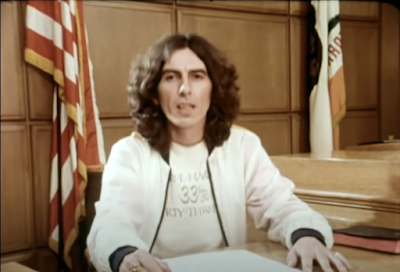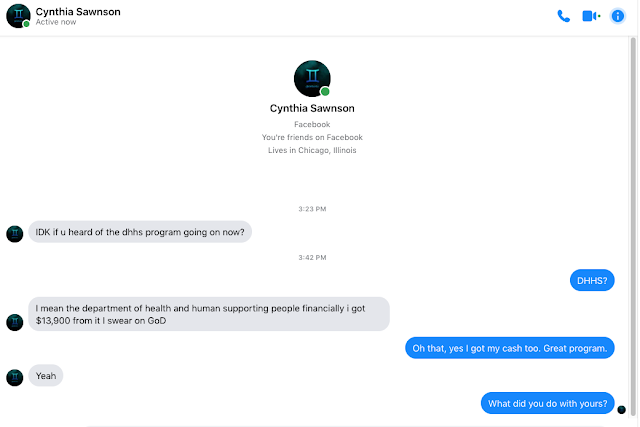 |
| George Harrison in the video for "This Song." |
"Songs about Lawyers" week continues. If you missed the first installment, you can find it here.
I hesitated to include George Harrison's "This Song" in my week of tunes related to attorneys, since it never mentions lawyers or the law, specifically. You have to know the backstory. In February, 1976, a trial began against the former Beatle,, accusing him of stealing the tune for "My Sweet Lord" from the Chiffon's 1963 hit of Ronnie Mack's "He's So Fine."
The song is an upbeat, joyous, piano-driven middle finger waved at the lawsuit, which had just begun.
"This song, as far as I know, don't infringe on anyone's copyright, so..." Harrison sings.
"This song, as far as I know, don't infringe on anyone's copyright, so..." Harrison sings.
Harrison had recently found himself in court, on the stand, guitar in hand, demonstrating the process by which he allegedly wrote "My Sweet Lord" and trying to point out the musical differences between it and "He's So Fine."
Had Harrison waited until the case concluded, in 1998, 22 years later, "This Song" probably would have been far slower, darker and more melancholy. It has a certain buoyancy that would be ground out of him.
After I watched the proudly cheesy and amateurish video (which Harrison directed), shot in a Los Angeles courtroom, and was glad I included the song. Besides, it's got that great sax solo.
There's a lot going on in the video, including the Rolling Stones' Ronnie Wood, in drag, mouthing Monty Python's Eric Idle's screech, "Could be 'Sugar Pie Honey Bunch'? Naw! Sounds more like 'Rescue Me!'" (indeed, both classic Motown songs echo the introduction of "This Song" as well as each other, a reminder that there is a lot of borrowing in music).
The song is larded with such sly winks at the case, including "This song has nothing 'Bright' about it"—Bright Music owned the copyright to "She's So Fine," and in turn was owned by Allen Klein, who until recently had been Harrison's manager, putting him in the unique position of profiting from both the release of "My Sweet Lord" and, potentially, from its copyright infringement settlement. Their animosity also helps explain what should have been handled with the quiet cutting of a check ended up a legal "Rime of the Ancient Mariner," a case that has been described as "without question, one of the longest running legal battles ever to be litigated."
Harrison released the song Dec. 3, 1970, and it became a huge international hit—the first by a former Beatle, and his biggest solo single. That is highly salient to the lawsuit, equal to the two songs' similarity. Without that pot of gold, the parallels would have been a bit of music trivia, like Mick Jagger singing backup on Carly Simon's "You're So Vain." Indeed, honorary Beatle Billy Preston released his version of "My Sweet Lord" three months before Harrison did, and nobody sued anybody.
The similarities were obvious. Radio stations would start playing "He's So Fine" then segue into "My Sweet Lord." In 1971, country music star Jody Miller put out her version of "He's So Fine," designed, rather maliciously, to highlight the two songs mirroring each other, complete with weeping slide guitar. Harrison said it "really putting the screws in."
Harrison might have been proud, and creative, but he wasn't an idiot. He first felt chagrined when the resemblance was pointed out, and remembered thinking, "Why didn't I realize?" Later, as the legal noose tightened, he tried to downplay his gaffe, blustering, "Well, it's not exactly the same."
In his autobiography, "I, Me, Mine," Harrison does his best to feign outrage, dismissing the merits of the suit with, "It's a joke ... just greed and jealousy and all that."
Despite the clear borrowing—it's the same tune—the case itself was maddeningly complex. Since it defied belief to suggest that a talent like Harrison, fresh from the Beatles, merely copied the music, the judge suggested it was a case of "subconscious" plagiarism.
Harrison said he tried to give the plaintiff the rights to the song, just to be done with it. But his lawyers (boo, hiss) wouldn't permit it. Judge Richard Owen ruled that it was "perfectly obvious" that "the two songs are virtually identical." Which they are. During the trial, a keyboardist was recalled pointing that out when they were recording "My Sweet Lord" in May, 1970. Which didn't help. Maybe he wasn't forceful enough. In September, 1976, Harrison was found to have inadvertently copied the song. Which is when the years began to really clock by, determining the judgment. Harrison was eventually stuck with a $1.6 million penalty, which observers felt was excessive, ignoring the role his fame as a Beatle and the artistry he brought to "My Sweet Lord" played in its success in favor of the tune, which is not exactly hummable.
Eventually, factoring in Klein's double-dealing—he used information he knew from producing the song in suing Harrison—in 1981, the judgment was cut to $600,000, which included Harrison gaining rights to "He's So Fine." He did not, however, cut his own version.
Instead he left us with, "This Song." Written, Harrison notes, at "the end of a nightmarish week in court."
One noteworthy thing about "This Song" is, it isn't the only mainstream rock song about copyright infringement. There's also Weird Al Yankovic's "Don't Download This Song." (Set to the tune of "We Are the World," with a plot development borrowed from the end of "White Heat") It's worth seeing for the whimsical animation, and of course Weird Al's spot-on satire: "'Cause You start out stealing songs, then you're robbing liquor stores, and selling crack and running over school kids with your car."
That always reminds me of that cultural moment, an eternity ago, when the Napster free music sharing website first appeared, and I took the plunge and downloaded the Rolling Stones' "Satisfaction," while my wife, an officer of the court, remember, stood over me, remonstrating, "You're committing a crime!"
"So I'll send Mick Jagger a check," I said.
That always reminds me of that cultural moment, an eternity ago, when the Napster free music sharing website first appeared, and I took the plunge and downloaded the Rolling Stones' "Satisfaction," while my wife, an officer of the court, remember, stood over me, remonstrating, "You're committing a crime!"
"So I'll send Mick Jagger a check," I said.
I never did. I hope he doesn't sue me.










